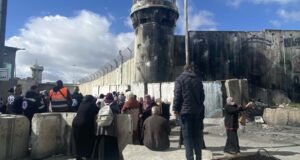8th July 2016 | International Solidarity Movement, al-Khalil team | Hebron, occupied Palestine
Israeli forces during the last week of the Islamic holy month of Ramadan have increased and stepped up restrictions for Palestinians in occupied al-Khalil (Hebron). Thus they are severely limiting Palestinians possibilities to exercise their religion during this most important month in the Muslim calendar, and on a large scale to celebrate the second most important feast, Id il-Fiter, marking the end of Ramadan.
Despite most of the checkpoints in the old city of al-Khalil a maze of restrictions, harassment and intimidation by Israeli forces on daily basis, the restrictions were stepped up even more at the end of Ramadan, enforcing age limit barring any Palestinian between 15-30 from accessing the area around the Ibrahimi Mosque. But it is not just the actual physical occupation, but even more the psychological occupation imposed by the Israeli forces. Whereas the age-restriction in theory is implemented at all three checkpoints allowing to access the Ibrahimi Mosque area, it was only implemented on some days, at some hours, by some soldiers. Thus, trying to reach the mosque for prayer during Ramadan, or visiting family during Eid, no Palestinian would ever be able to tell whether or not they would be allowed. Is the trip to the checkpoint even worth trying, or would Israeli forces deny a person in that age-group anyways? Or would they let a youth within this age-group pass anyways, but then arbitrarily decide to deny another person? Even worse, as a Palestinian, one can never tell whether, even if just on the way to quickly buy groceries from the store close-by, one would ever come back home, as arbitrary arrests are common, as are attacks by settlers. Due to this arbitrariness and the Israeli forces’ complete impunity, one would never be able to tell, whether or not one is be allowed to pass one single checkpoint – and coming from most directions to reach Ibrahimi Mosque at least three different checkpoints have to be navigated.
Similarly, the complete closure of most of the entries and exits of al-Khalil, has been arbitrarily imposed in the first place, and then arbitrarily managed, opening some of the checkpoints for maybe a few hours, but then closing it again, denying anyone from passing. South Hebron suddenly, the last night of Ramadan, and thus the beginning of the 3-day festival of Eid, was declared a ‘closed military zone’, denying any Palestinian to leave or access the area. This happened on the night, where most people were out, celebrating the start of Eid after 30 days of fasting during Ramadan, doing shopping.
On the morning of Wednesday 6th July, the first day of Eid, where Palestinians traditionally go and visit all their family, Israeli forces set up additional checkpoints at most exits of al-Khalil and the surrounding villages, deliberately slowing down the holiday-traffic. In the Tel Rumeida neighborhood, that was entirely closed as a closed military zone for more than six months, families marked a sharp increase in visitors as Israeli forces seemed to have managed to create an atmosphere of fear that stopped Palestinians from visiting their families even during this important holiday. Especially young men – a common target of extrajudicial executions by Israeli forces during the last months – simply didn’t want to risk crossing Shuhada checkpoint, with their family stating that they don’t want yet another Palestinian, a family member, gunned down by Israeli forces without a reason, but with complete impunity.
Additionally to the physical obstacles, that with no doubt are manifold and literally create a maze at times impossible to navigate for any Palestinian, the psychological occupation, the technique of wearing people down, trying to break their will, needs to be taken into consideration. Can you imagine not ever being able to know what will happen, whether you’ll come back home, even if just out for five minutes? This daily insecurity, the inability to ever plan, or even feel safe inside one’s own home, is deliberately forced on Palestinians by the Israeli forces. Rather than a by-product of the occupation, it is a deliberate strategy that amounts to psychological torture in the every-day lives of Palestinians. Despite the ongoing and intensified attempts by Israeli forces to step up on either of these two forms of apartheid-measures and collective punishment of the Palestinian population in attempts to create a coercive environment that in the end would lead to a forced displacement of Palestinians, the Palestinians remain steadfast and defy these attempts at ethnic cleansing.
 International Solidarity Movement Nonviolence. Justice. Freedom.
International Solidarity Movement Nonviolence. Justice. Freedom.


